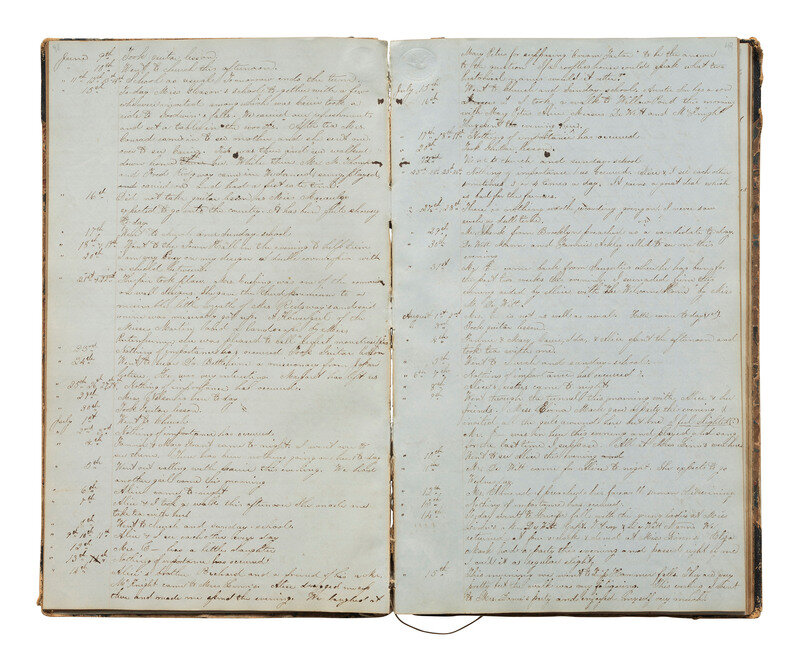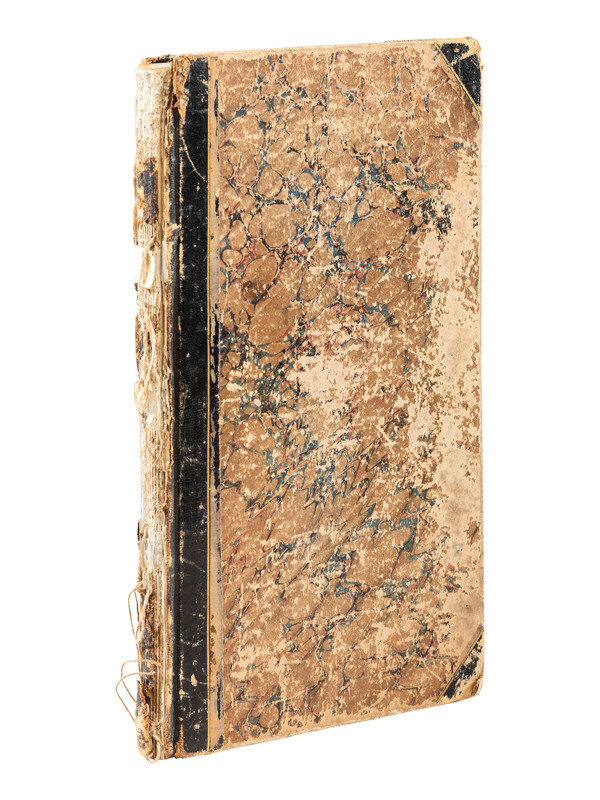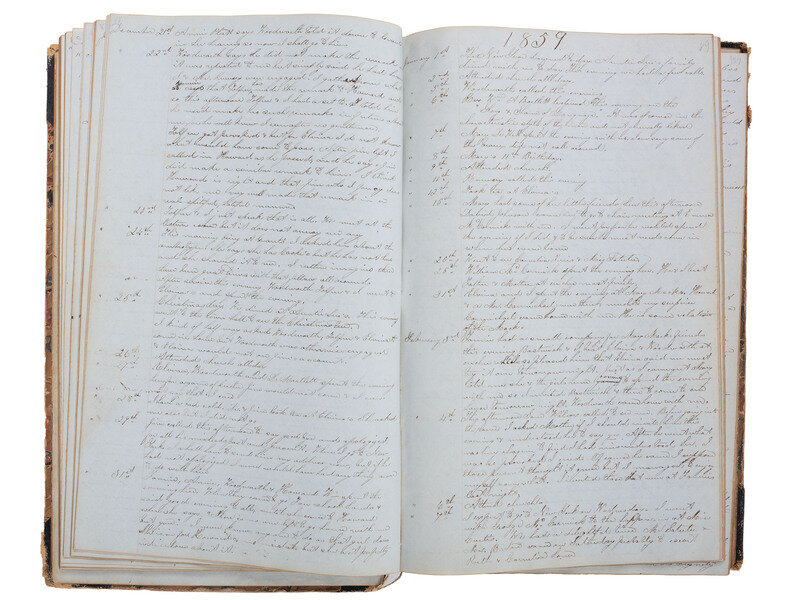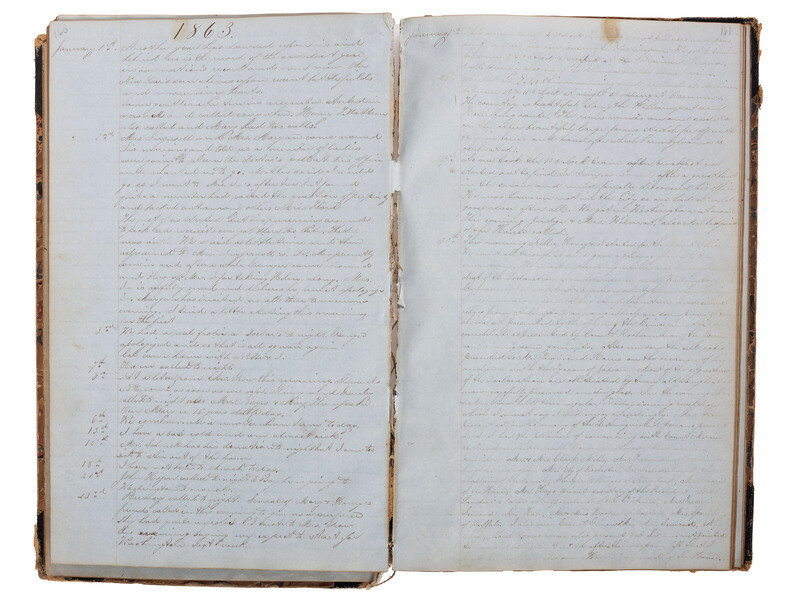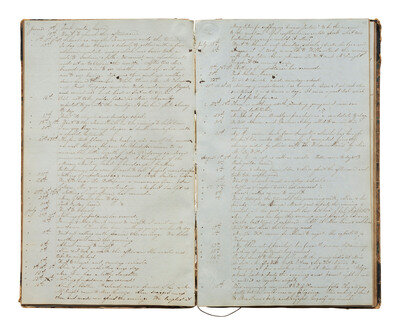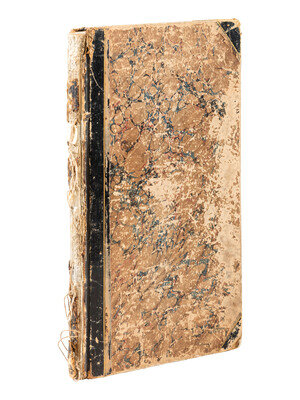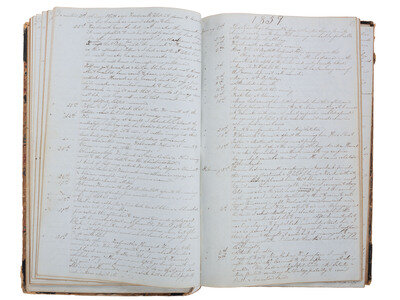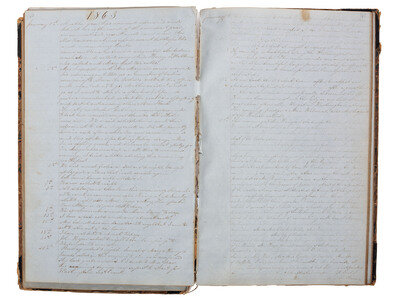America in Manuscript
Diary of Miss Louise St. John (1839-1938), including description of a visit to meet the Lincolns at the White House. Ithaca and New York City, New York, 1852-1867.
Diary of Miss Louise St. John (1839-1938), including description of a visit to meet the Lincolns at the White House. Ithaca and New York City, New York, 1852-1867.
Sale 2112 - Visions of America: The Stephen White Collection
Oct 24, 2024
10:00AM ET
Live / Cincinnati
Estimate
$1,000 -
1,500
Lot Description
America in Manuscript
Diary of Miss Louise St. John (1839-1938), including description of a visit to meet the Lincolns at the White House. Ithaca and New York City, New York, 1852-1867.
Diary of Miss Louise St. John (1839-1938), including description of a visit to meet the Lincolns at the White House. Ithaca and New York City, New York, 1852-1867.
Manuscript diary, 233pp, 7 3/4 x 12 1/4 in., ink on lined paper, marbled boards, with near daily entries from 1852-1867. Diary records a fifteen-year span (ages 12-27) with entries that are generally brief, but substantive. The unusually long span of the journal allows for a detailed portrait of St. John, as well as her family and community, to emerge. Accompanied by 258pp typed transcription of the diary.
Born to a prominent New York businessman, Louise (sometimes Louisa) St. John was a well-educated, well-connected young woman of high social standing. Though her family's primary residence is in Ithaca where her father co-owns a silk factory, she travels regularly to and from New York City. Diary entries regularly record activities that would be typical of a young woman in her class: attending church and school, visiting family, taking music and language lessons, and making and receiving, house calls to/from individuals with notable New York family names such as Schuyler, DeWitt, and Clinton. The young diarist also records deaths and funerals, marriages, visits to the dentist, illnesses, parties, sleigh rides, picnics, and quarrels with other young ladies of her acquaintance. St. John is an accomplished musician, documenting her lessons and performances on various instruments including piano, harp, guitar, and organ. As she ages, her involvement in the musical community deepens, foreshadowing her adult life during which she she spent fifty years as a musician and piano teacher.
The diary offers a unique glimpse into the cultural life of Ithaca, New York, referencing among other activities: the Episcopal ladies' annual "Strawberry festival"; a balloon ascension on 31 August 1859; the 22 February 1862 "illumination in honor of Washington's Birthday" which featured 100 guns fired, ringing bells, and a recitation of Washington's farewell address; a visit to the local glass factory; and a wide array of other activities. St. John was a regular attendee at local musical performances and religious, literary and/or educational lectures, including a November 1857 lecture by Horace Mann described by St. John as being intended "to prove man lower than beast." (She was decidedly more impressed by an 1859 lecture in New York City by Edward Everett on the early life of Franklin: "I must confess my self not at all disappointed in the great orator. He is thoroughly a scholar & the gentleman find his oratory is of the most polished and refined a school.") Among the more unique activities recorded in Ithaca are a visit on 22 October 1853 "to see the Siamese Twins Chang and Eng Brinker. A daughter of Cheng and son of Eng accompanied them....They all had dark complexions, black hair and eyes, and were small in stature...." The following year she visited "The Menagerie" noting that "There were some very fine animals there." In May 1855, she writes that "father took us to Washburn's Indian Museum and Amphitheatre. It turned out to be a regular circus. But the riding and and acrobatic exercises were excellent..."
St. John's father erected a silk manufacturing factory in Ithaca in 1852, and St. John regularly records visits there. She notes in July 1853 the arrival of machinery for her father's silk factory, and on 30 Aug 1853 writes, "This afternoon we went down to the Factory. They have begun to teach their girls. I can join the silk when it breaks...." Her father served later as a president of the Village of Ithaca, and despite his regular travels enjoyed leisure activities. In July 1861, St. John records her father's participation in a growing pastime: "Father went to Moravia with the ball players as their umpire in the match." He came home elated "having been in the match and being the first match in which the Moravians were ever beaten." Other notable town happenings are regularly recorded by St. John including a murder suspect brought to town for trial, and the suicide of a resident. Throughout the diary she describes holidays and their accompanying celebrations, including July 4th, Thanksgiving, Christmas, and New Year's.
Politics are increasingly referenced as Louise ages and as the Civil War approaches. As a 17-year-old she records the 30 October 1856 mass meeting in Ithaca of supporters of Presidential candidate John C. Fremont. Days later she notes that she and two fellow young women were "folding ballots lending our aid to the glorious cause of the Country." On 21 September 1860, she writes that "The Auburn Guard had a parade today [in Ithaca] and this evening the Wide Awakes were out so the Bell people had a demonstration and of all sounds I never heard the like." During the Civil War she includes occasional references to major engagements. St. John is a Unionist, and during the conflict she engages with other women in domestic endeavors to support the Union war effort such as "making Union rosettes" and "making red flannel shirts for Capt. Cowe's volunteers." In 1862 she notes Lincoln's call for 300,000 troops and the possibility of a draft, which she fears will bring the war home to her. On 4 November 1864 she records a political gathering in Ithaca held in advance of the pivotal U.S. Presidential election: "Today the Union men appointed a Mass Meeting but alas, the rain descended in torrents...Not withstanding some 400 wagons were in town and a much larger number of voters than at the Copperhead meeting...We hung red, white & blue in our windows & put Lincoln & Johnson, Grant in evergreen letters over the front door with two little flags...."
Most notable in the diary is an 1863 visit to Washington, D.C. and Baltimore to visit "Mrs. Grow," likely Mrs. Helen Amelia Fuller Grow, wife of Frederick Plummer Grow (1816-1881). Frederick Grow was the brother of outspoken Republican politician Galusha A. Grow, who at the time was serving as the 24th Speaker of the United States House of Representatives. Diary entries indicate that the Grows were well-connected in Washington, D.C. and Baltimore society, and actively engaged Louise throughout the time she visited. While Louise recalls with interesting detail her visit to various Washington, D.C. landmarks, museums, a Civil War hospital, and other engagements, by far most interesting are her entries spanning 29 January through 26 February describing parties attended at the Grow's home and other excursions which inevitably included the list of Washington, D.C. politicians and elites she encountered. She writes this on 31 January 1863 of her visit to the White House: "Before going to the White House, Mrs. Grow took me to call on Madame Carl Schurz, who is a young & quite pretty German. We then went to see Mr. & Mrs. Lincoln. The President is a tall very plain looking man who shook hands with me and said 'How do you do.' Mrs. L also shook hands. She is the best looking of the two, was dressed in black velvet and appeared much better than I expected. She has however a harsh voice and has by no means the bearing of an elegant well bred woman." Others encountered during her visit include U.S. Senators, Lincoln's cabinet members, and the children of Union officers. St. John later records the joyous reception in New York City on news of the Battle of Richmond and Lee's surrender, as well as Ithaca's observance of Lincoln's funeral on 19 April 1865 after the country was "plunged into the deepest grief by the assassination of President Lincoln."
Visits to New York City with her father give St. John ample opportunity to enjoy society and cultural events. She regularly attends the opera, and records her attendance at performances at the Academy of Music, the Philharmonics, and various other venues. She visits the Astor Library Egyptian Museum, the Dusseldorf Gallery of Paintings, and "Aspinwall's Gallery." In October 1860 she visits New York City with the purpose of seeing the Prince of Wales, and has the opportunity to witness a torchlight procession in honor of the Prince. "Our company cheered his Royal Highness and in the glare of the fireworks we saw him raise his hat. I never saw such crowds of people before...."
Entertainments in New York City and Ithaca also included playing euchre and attending a variety of gatherings such as "a Charade party," "a hop," a "walking party," and a "Happen-in." Throughout the diary St. John enjoys the company of many gentlemen callers, but seems only mildly interested in any of them. She records a steady stream of weddings especially following the Civil War, but she herself would never marry. Her final entry on 31 December 1867 reads: "The last day of 1867 and with it I have nearly written the first volume of my journal...I will take a new book and may I be permitted to record in its pages as much of the joy and as little of sorrow as have filled these pages."
Louise St. John was the daughter of prominent Ithaca, New York, businessman and banker Thomas Powell St. John (1817-1880) and Mary Ann Hibbard St. John (1820-1896). Born in Ithaca, she spent the majority of her life in New York prior to moving to Chicago, Illinois, in her final years to live with her only surviving relative. Her brother would serve several times as the mayor of Ithaca, and a nephew would serve as a trustee of Cornell University. Though St. John pledged in her journal on 31 December 1867 to begin a "new book," we locate no records for her in OCLC, Social Networks in Archival Context, Rare Book Hub, or elsewhere online.
An illuminating portrait of an accomplished, opinionated, and independent nineteenth-century woman.
This lot is located in Cincinnati.
Condition Report
Auction Specialist
